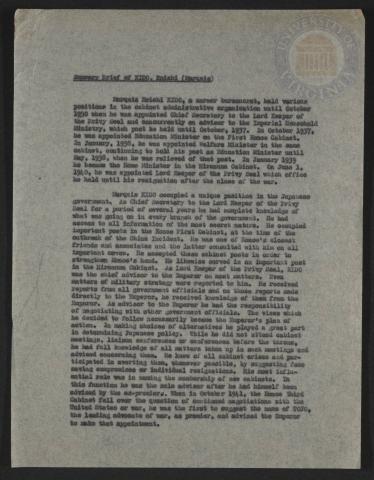
Page 1
| Parent | Summary Brief about Koichi Kido |
|---|---|
| Date | |
| Language | English |
| Collection | Roy L. Morgan Papers |
| Box | Box 3 |
| Folder | 1946 [IMFTE] (IPS) Translations of interrogations. |
| Repository | University of Virginia Law Library |
Summary Brief of KIDO, Koichi (Marquis)
Marquis Koichi KIDO, a career bureaucrat, held various positions in the cabinet administrative organization until October 1930 when he was appointed Chief Secretary to the Lord Keeper of the Privy Seal and concurrently an advisor to the Imperial Household Ministry, which post he held until October, 1937. In October 1937, he was appointed Education Minister on the First Konoe Cabinet. In January, 1938, he was appointed Welfare Minister in the same cabinet, continuing to hold his post as Education Minister until May, 1938, when he was relieved of that post. In January 1939 he became the Home Minister in the Hiranuma Cabinet. On June 1, 1940, he was appointed Lord Keeper of the Privy Seal which office he held until his resignation after the close of the war.
Marquis KIDO occupied a unique position in the Japanese government. As Chief Secretary to the Lord Keeper of the Privy Seal for a period of several years he had complete knowledge of what was going on in every branch of the government. He had access to all information o the most secret nature. He occupied important posts in the Konoe First Cabinet, at the time of the outbreak of the China Incident. He was one of Konoe’s closest friends and associates and the latter consulted with him on all important moves. He accepted these cabinet posts in order to strengthen Konoe’s hand. He likewise served in an important post in the Hiranuma Cabinet. As Lord Keeper of the Privy Seal, KIDO was the chief advisor to the Emperor on most matters. Even matters of military strategy were reported to him. He received reports from all government officials and on those reports made directly to the Emperor, he received knowledge of them from the Emperor. As advisor to the Emperor he had the responsibility of negotiating with other government officials. The views which he decided to follow necessarily became the Emperor’s plan of action. In making choices of alternatives he played a great part in determining Japanese policy. While he did not attend cabinet meetings, liaison conferences or conferences before the thrown, he had full knowledge of all matters taken up in such meetings and advised concerning them. He knew of all cabinet crises and participated in averting them, whenever possible, by suggesting face saving compromises or individual resignations. His most influential role was in naming the membership of new cabinet. In this function he was the sale advisor after he had himself been advised by the ex-premiers. When in October 1941, the Konoe Third Cabinet fell over the question of continued negotiations with the United States or war, he was the first to suggest the name of TOJO, the leading advocate of war, as premier, and advised the Emperor to make that appointment.
